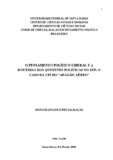| dc.contributor.advisor | Perez, Reginaldo Teixeira | |
| dc.creator | Canello, Júlio | |
| dc.date.accessioned | 2016-03-17T12:49:07Z | |
| dc.date.available | 2016-03-17T12:49:07Z | |
| dc.date.issued | 2008-12 | |
| dc.date.submitted | 2008 | |
| dc.identifier.uri | http://repositorio.ufsm.br/handle/1/1347 | |
| dc.description | Monografia (especialização) - Universidade Federal de Santa Maria, Centro de Ciências Sociais e Humanas, Curso de Especialização em Pensamento Político Brasileiro, RS, 2008. | por |
| dc.description.abstract | The present work discusses the influence of liberal political thought in the
understanding of the Supreme Court about the organization of powers and the politicalparliamentary
minority rights trough an analysis of the position adopted in the case of the "Air
blackout" parliamentary inquiry committee and by a short examination of the political
questions doctrine’s development in the Court. Initially, the text focuses on the manifestation
of the Minister Rapporteur trying to identify their arguments and disregard the main concepts
used in the formulation of its thesis. Then, the work treats about the evolution of the political
questions doctrine in the Brazilian Supreme Court trough a quick presentation of the Court’s
historical trajectory on the subject. Finally, it focuses on how central authors of liberal
thought face the issues raised making a comparison between the key concepts used by the
Rapporteur of the case and aspects of political theory. According to the statements reviewed,
we could see the influence of liberal ideas in the understanding of the Court about the
institutional issue. Moreover, the speech of the judge grants the judiciary a role as arbiter and
moderator in the relationship between powers and indicates some centrality to the protection
of political-parliamentary minorities in the democratic system. In short, according to the observed manifestations about the understanding of the Supreme Court, the democratic
system has significant liberal qualifications. | eng |
| dc.language | por | por |
| dc.publisher | Universidade Federal de Santa Maria | por |
| dc.rights | Acesso Aberto | por |
| dc.subject | Pensamento político liberal | por |
| dc.subject | Direito das minorias político-parlamentares | por |
| dc.subject | Doutrina das questões políticas | por |
| dc.title | O pensamento político liberal e a doutrina das questões políticas no STF: o caso da CPI do “apagão aéreo” | por |
| dc.title.alternative | The liberal political thought and the political questions doctrine in brazilian supreme court: the case of “air blackout” Parliamentary Inquiry Committee | eng |
| dc.type | Trabalho de Conclusão de Curso de Especialização | por |
| dc.degree.local | Santa Maria, RS, Brasil. | por |
| dc.degree.specialization | Pensamento Político Brasileiro | por |
| dc.description.resumo | O presente trabalho discute a influência do pensamento político liberal na
compreensão do Supremo Tribunal Federal sobre a organização dos poderes e sobre os
direitos de minorias político-parlamentares a partir de uma análise do posicionamento adotado
no Caso da CPI do Apagão Aéreo , bem como mediante breve exame do desenvolvimento
da doutrina das questões políticas na Corte. Inicialmente, o texto enfoca a manifestação do
Ministro Relator no caso analisado, buscando identificar seus argumentos e abstrair os
principais conceitos utilizados para a formulação de sua tese. Em seguida, discorre-se sobre a
evolução da doutrina das questões políticas no STF mediante rápida apresentação da trajetória
histórica da Corte relativamente ao tema. Por fim, observa-se como autores centrais do
pensamento liberal enfrentam as questões suscitadas, efetuando-se um cotejo entre os
principais conceitos utilizados pelo Relator do caso e aspectos da teoria política. Segundo os
pronunciamentos analisados, pôde-se perceber a influência do ideário liberal na compreensão
da Corte quanto à questão institucional. Além disso, o discurso do julgador atribui ao
Judiciário uma função arbitral e moderadora na relação entre poderes, bem como confere
certa centralidade à proteção das minorias político-parlamentares no regime democrático. Em
suma, segundo as manifestações observadas, na compreensão do Supremo relativamente aos
temas em questão, o regime democrático possui significativas qualificações liberais. | por |
| dc.publisher.unidade | Centro de Ciências Sociais e Humanas | por |


